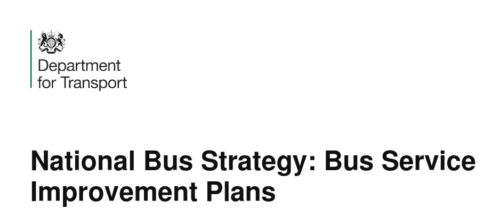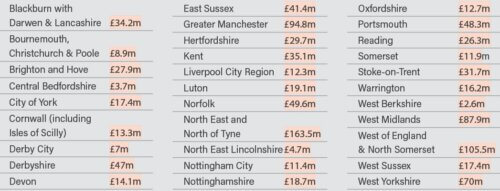Government confirms nearly £1bn to overhaul and level-up major local transport schemes, but some Local Authorities will only receive part of the amount requested, whilst others miss out altogether
Thirty-one counties, city regions and unitary authorities have been chosen for funding to ‘level up’ local bus services in the latest awards from the Government’s bus transformation programme. Including earlier awards, the Government said that just under two thirds of England’s population outside London will benefit from the total investment which it says will make buses more frequent, more reliable, easier to understand and use, cheaper, or greener. Improvements will also include integrated ticketing and more bus lanes intended to speed up journeys.
The Government said the successful areas have been chosen because of their ‘ambition to repeat the success achieved in London’ – which it says drove up bus usage and made the bus a natural choice for everyone, not just those without cars. As the Government stated in last year’s national bus strategy, areas not showing sufficient ambition, including for improvements to bus priority, will not be funded. At the same time, a further £150m is being provided across England to maintain service levels as patronage continues to recover after the pandemic.
Of the 79 submissions, 31 will receive some or all of the funding requested as part of their Bus Service Improvement Plans (BSIPs).
Mayoral combined authorities will also receive money for buses from the £5.7bn City Region Sustainable Transport Settlements (CRSTS) fund, intended to level up local bus, tram, rail, walking and cycling networks in England’s eight city regions. The CRSTS, first announced in the Autumn Statement, aims to give the mayors of England’s largest cities long-term certainty to plan and deliver transformational improvements to their local transport systems. The funding is expected to help deliver, among other things, a new mass transit network in West Yorkshire, a flat fare on buses in Greater Manchester and bus rapid transit corridors in the West Midlands.
The new announcements, along with the funding of zero-emission buses, and the bus elements of the increased CRSTS funding, form part of the £3bn for bus transformation announced in 2020. Around £2bn has also been paid to support bus and light rail services during the pandemic.

Industry response
Commenting on the funding, a spokesperson for the Confederation of Passenger Transport (CPT) said: “Today is an important milestone in the Government’s National Bus Strategy. Operators are ready to engage with successful local authorities to deliver their joint plans for improvement in bus services as quickly as possible to help deliver important goals such as the drive to net zero and economic growth across the country.
“It is important that we remember though that there will be millions of passengers left disappointed by today’s announcement as their local area missed out on funding. It’s vital that the Government now clearly sets out future funding plans and policy initiatives for delivering its National Bus Strategy, including measures to reduce car use. This will ensure that today’s announcement is the beginning not the end of plans to improve bus services across the country. A good place to start would be to confirm funding for the industry’s plan to deliver simpler and price capped ticketing across the country – a move that would improve bus services for passengers everywhere.”
Paul Tuohy, Chief Executive of Campaign for Better Transport, added: “Improving buses in a minority of places does not live up to the promise of a national bus strategy, though locally it will be very welcome. Rather than this fragmented, competitive way of funding local buses we want to see more of a focus on revenue funding to ensure every community gets the bus service it needs and deserves. With a large number of losers from today’s announcement, it’s important communities that have missed out are not left behind, and that those local authorities are given the funding and support through the long-awaited Bus Centre of Excellence to overcome barriers to being successful in the future.”
Since a large number of Local Authorities that submitted bids were unsuccessful and will not receive funds to deliver bus service improvement plans and some of those that have received funding have received all the money they requested, Campaign for Better Transport is said that, with an estimated £10 billion needed by local authorities to improve bus services, the money awarded falls woefully short.
The transport charity is warning a much greater investment will be needed and is calling on the Government to tackle the buses crisis by redirecting a fifth of its £27 billion road building budget into a single, long-term bus funding pot, giving a greater focus on revenue funding, and giving local authorities that missed out capability funding and support through the Bus Centre of Excellence.
Talking to the Ipswich Star about the results Steve Bryce, General Manager at Ipswich Buses, said: “I am disappointed but not surprised that Suffolk County Council had failed to secure any of the funding for its Bus Service Improvement Plan as it lacked ambition and did not include key items that the DfT were looking for.
“These included key items that were requested by Ipswich Buses such as support to reopen the Bury Road park & ride, funding to reduce emissions such retrofitting bus exhausts with emission traps or exploring alternative fuels.
“In Suffolk we do not have any robust or effective partnerships that have delivered any improvements to the public transport network and reduced journey times for our customers. Through the Ipswich Quality Bus Partnership, I have been urging Suffolk County Council to listen and work with bus operators to get the basics right before we look at fantasy projects like combining Ipswich’s two bus stations.
“Any authority that allows buses to be forced out of existing bus priority corridors such as the situation we have in Fore Street can’t act surprised that they are not considered by the Government to be pro-public transport.”


